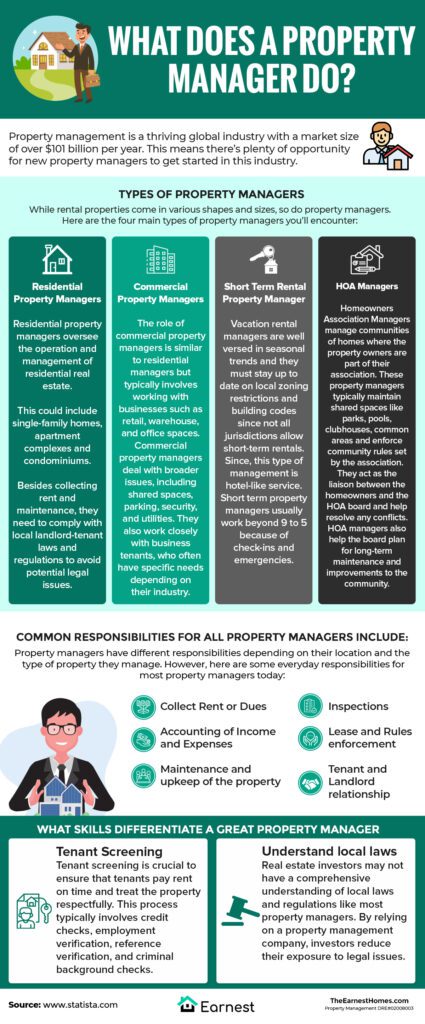 Now has never been a better time to get involved in property management. The industry has seen steady business growth in the past five years and continues to have a strong economic outlook in the coming years.
Now has never been a better time to get involved in property management. The industry has seen steady business growth in the past five years and continues to have a strong economic outlook in the coming years.
However, it’s important to understand what property managers do before you jump into the field. This article will cover the main responsibilities and tasks property managers are faced with each day so you can decide if this is the right field for you to start a career.
Types of Property Managers
Property management is a diverse field with many different facets. Here are the main types of property managers today:
Residential Property Managers
A residential property manager is responsible for overseeing and managing residential real estate properties on behalf of property owners.
Their duties typically include finding and screening tenants, collecting rent, handling maintenance and repairs, complying with local laws and regulations, and maintaining communication between property owners and tenants.
The goal of a residential property manager is to keep tenants in their units for as long as possible by meeting their needs and expectations.
Commercial Property Managers
A commercial property manager is someone who manages commercial real estate properties like office buildings, shopping malls, warehouses, and real estate investment properties.
These people typically handle property maintenance, tenant relations, lease administration, rent collection, and financial reporting for the property. They may also handle issues like shared spaces, parking spot management, and building security.
Short-Term Rental Property Managers
Short-term property managers are involved in managing and maintaining short-term rentals and other properties not intended for long-term tenants. This includes vacation homes, Airbnb listings, and much more.
These managers often handle listing the property on various websites to attract renters, communicating with potential guests, pricing the property, and maintaining it to ensure there are adequate supplies and amenities for guests during their stay.
HOA Property Managers
An HOA (Homeowners Association) property manager is a professional responsible for overseeing the day-to-day operations and management of a residential community governed by an HOA.
Their duties include maintaining common areas, enforcing community rules and regulations, collecting HOA fees, budgeting, coordinating maintenance and repairs, and serving as a liaison between homeowners and the HOA board of directors.
Common Responsibilities of Property Managers
As you can see, the responsibilities of different types of property managers tend to overlap in some cases. Here’s a comprehensive explanation of what property managers do on a day-to-day basis.
Collecting Rent or Dues
Effective rent management is a crucial aspect of a property manager’s responsibilities. They handle the collection and processing of rent payments while maintaining accurate records of all rent transactions.
Property managers are also responsible for managing late payments. When late or missing rent payments occur, they take proactive measures like issuing notices and enforcing the appropriate actions outlined in the lease agreement.
Maintenance and Upkeep of the Property
Maintaining the overall condition of the property is another important part of being a property manager. They must oversee regular upkeep, which includes maintenance activities like tending to landscaping, ensuring the cleanliness of common areas, and up-keeping amenities.
In times of emergency, property managers step up by promptly responding to urgent maintenance and repair requests to prioritize tenant safety and prevent any escalation of property damage.
Inspections
Inspections are key to ensuring a safe living environment for everyone. Property managers often schedule inspections for things like fire safety, HVAC systems, pest control, plumbing, electrical, and more.
Without proper inspections, you expose yourself to potential liability that could result in injuries to your tenants and legal disputes for you and your company.
Lease and Rules Enforcement
Enforcing the terms and conditions of the lease agreement is necessary to ensure tenants are abiding by their commitment to the property when they signed the lease.
Property managers must respond to any complaints or clear violations of lease agreements with actions that protect the property and ensure everyone is living in a safe environment.
Landlord and Tenant Relationship
The landlord-tenant relationship is something that property managers must navigate with prudence. Maintaining a good relationship with tenants is key to running a successful community at your property.
Accounting of Income and Expenses
Financial management is a critical aspect of property management that involves handling the financial aspects of owning, operating, and maintaining their properties.
Property managers need to create budgets for each property they manage, which involves forecasting income, estimating expenses, and setting financial goals.
Additionally, property managers must oversee various expenses related to property maintenance, repairs, utilities, insurance, and taxes.
What Skills Differentiate a Great Property Manager?
Great property managers aren’t just born–they learn through hands-on experience and from other skilled professionals. Here are a few skills that differentiate a great property manager from mediocre ones.
Tenant Screening
Great property managers understand that effective tenant screening is the first step to establishing a successful property. Tenant screening allows property managers to filter out potentially problematic tenants through background checks, credit checks, and rental history reports.
Understanding Local Laws
It’s crucial to understand local laws if you want to be a great property manager. Important parts of property management like security deposits, lease regulations, and inspection requirements vary between states, which means property managers must have a solid understanding of local laws to comply with regulations.
